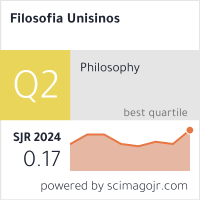Excess, absence and disappointment of significations: An ethical and semantic reflection on a traumatic event in Argentine history
DOI:
https://doi.org/10.4013/1000Resumen
The article advances, from the point of view of the philosophy of language and ethics, a critical refl ection on the political phenomenon of Argentine Peronism. It claims that each of the historical periods in this movement is marked by a different kind of discourse and enunciation: in the period of the rise to power, the excess of significations; in the period of exile, the absence of significations; and in the period of decay, a disappointment of signifi cations. The author proposes, in the light of Paul Grice’s theory of conversation, that these linguistic types of discourse have a meta-pragmatic character, since they go beyond the rationalist and moralist framework of this theory and involve affective and rhetoric elements that do not fi t the standard of “deviation from maxims”. The article contends that Veron’s and Sigal’s analysis of discourse is more appropriate than the pragmatic approach to understand complex ethical and linguistic phenomena such as Peronism.
Key words: signification, Peronism, ethics, pragmatics, Grice.
Descargas
Métricas
Descargas
Publicado
Cómo citar
Número
Sección
Licencia
Concedo a revista Filosofia Unisinos – Unisinos Journal of Philosophy o direito de primeira publicação da versão revisada do meu artigo, licenciado sob a Licença Creative Commons Attribution 4.0 (que permite o compartilhamento do trabalho com reconhecimento da autoria e publicação inicial nesta revista).
Afirmo ainda que meu artigo não está sendo submetido a outra publicação e não foi publicado na íntegra em outro periódico e assumo total responsabilidade por sua originalidade, podendo incidir sobre mim eventuais encargos decorrentes de reivindicação, por parte de terceiros, em relação à autoria do mesmo.










